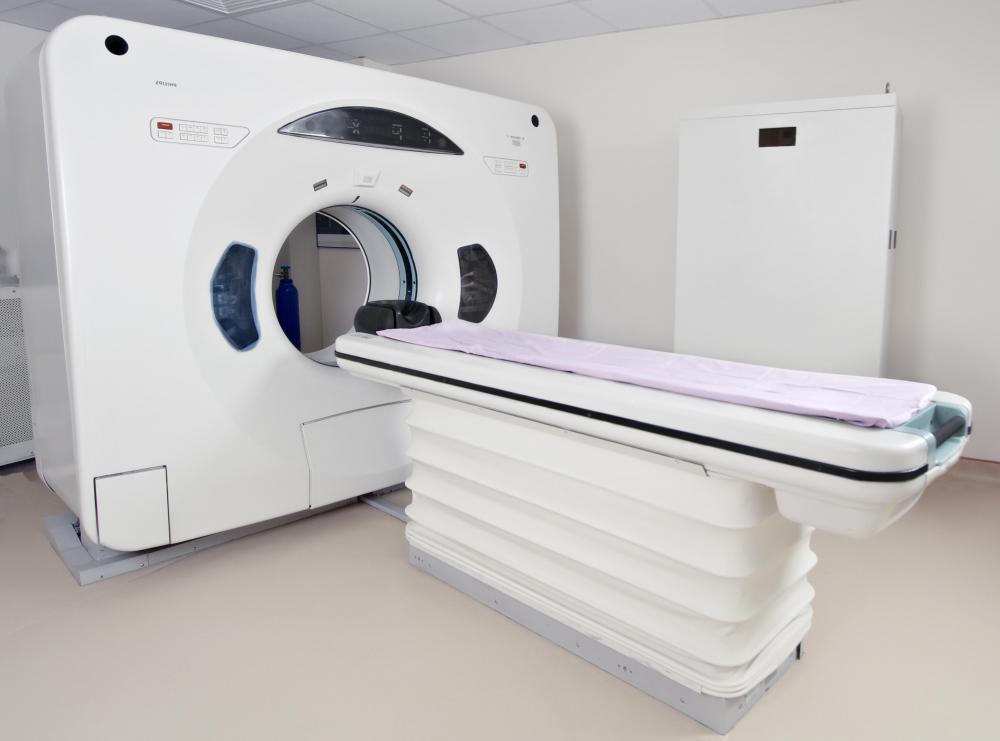At WiseGEEK, we're committed to delivering accurate, trustworthy information. Our expert-authored content is rigorously fact-checked and sourced from credible authorities. Discover how we uphold the highest standards in providing you with reliable knowledge.
What is MRI Disease?
MRI disease is a very rare disease associated with the use of certain contrast agents in magnetic resonance imaging scans performed on patients with impaired kidney function. In these patients, the contrast agents have been linked with the development of a condition called nephrogenic systemic fibrosis (NSF), where collagen builds up in the body, eventually leading to organ damage and death. Treatment for this condition relies on trying to correct the underlying kidney problem, while also providing supportive care, and it is ultimately fatal.
The contrast agents linked with the development of MRI disease all appear to contain gadolinium, a type of metal. In people with healthy kidneys, the kidneys process the metal after the MRI and the body safely excretes it. People with impaired kidneys cannot metabolize the contrast agent appropriately, and it apparently contributes to the development of NSF. Controlling for other known causes and risk factors, NSF and a history of the usage of MRIs with contrast have been clearly linked in a number of patients.

In 2010, the Food and Drug Administration in the United States responded to concerns about MRI disease by applying its toughest warning, the black box label, to contrast agents containing gadolinium. The label warns against using these materials in patients with renal impairment, including patients in renal failure and patients with acute kidney injuries. While some manufacturers protested the warning label, the FDA felt it was appropriate on the basis of the information it reviewed in the process of studying the connection between MRI scans and the development of NSF in patients.

People with kidney disease are at increased risk in general when taking any medication metabolized by the kidneys, because their bodies may not be able to eliminate the medication in a timely fashion. People with a history of kidney problems should discuss the contrast agents being used in medical imaging studies to confirm they are safe. It is also advisable to read medication warnings carefully and to make sure doctors and pharmacists are aware of the kidney issues so they can catch medication errors before they happen.

Just receiving an MRI is not dangerous for a patient with kidney problems, and there are other contrast agents safe for use in such patients. MRI disease is linked specifically with the use of contrast agents containing gadolinium. Development of conditions like MRI disease is one reason agencies like the FDA engage in ongoing surveillance of products approved for medical use, to check for the development of conditions that only appear years after exposure.
AS FEATURED ON:
AS FEATURED ON:















Discussion Comments
@fBoyle-- As far as I know, gadolinium is supposed to be the safer contrast agent available for MRIs. It's injected intravenously and the gadolinium settles into abnormal tissues showing them in the MRI. It's helpful in diagnosing tumors. An MRI can be done without the use of a contrast agent as well.
My uncle has been getting MRIs with gadolinium for multiple sclerosis prognosis. He doesn't have any kidney problems as far as we know. My aunt was saying over the phone that he is having a weird rash lately that might be because of the gadolinium. His doctor is having his kidneys checked out to make sure he doesn't have any problems.
The main assumption is that if your kidneys are healthy, gadolinium used in MRIs shouldn't be a problem. But I think it's still too early to reach this conclusion. I think more research has to be done on this. Perhaps, gadolinium might remain in tissues even in people who don't have kidney problems.
This is an interesting and important topic. I wasn't aware that the FDA released a warning relating to MRIs.
What I don't understand is, do all MRI machines use gadolinium? Is there an alternative, safer metal that can be used instead?
I know that there are alternatives to MRIs. But if there is an alternative to this metal, why can't we use that instead of gadolinium? If MRI disease and gadolinium have clearly been linked to one another, it doesn't make sense for us to continue to use this metal in my opinion.
MRI disease is precisely why people shouldn't get an MRI unless it's really necessary.
I work in a doctor's office and I have witnessed several patients insisting that they get an MRI even though the doctor didn't think it was necessary. In fact, some people think that it should be a part of a routine yearly check-up.
I think sometimes an MRI is necessary. Especially if a disease or condition has to be diagnosed. I also had one recently which diagnosed my herniated disc. But having an MRI done when there is no necessity is dangerous. I think that some people might not even be aware of kidney problems, so how can we know for sure whether an MRI poses a risk or not?
Post your comments